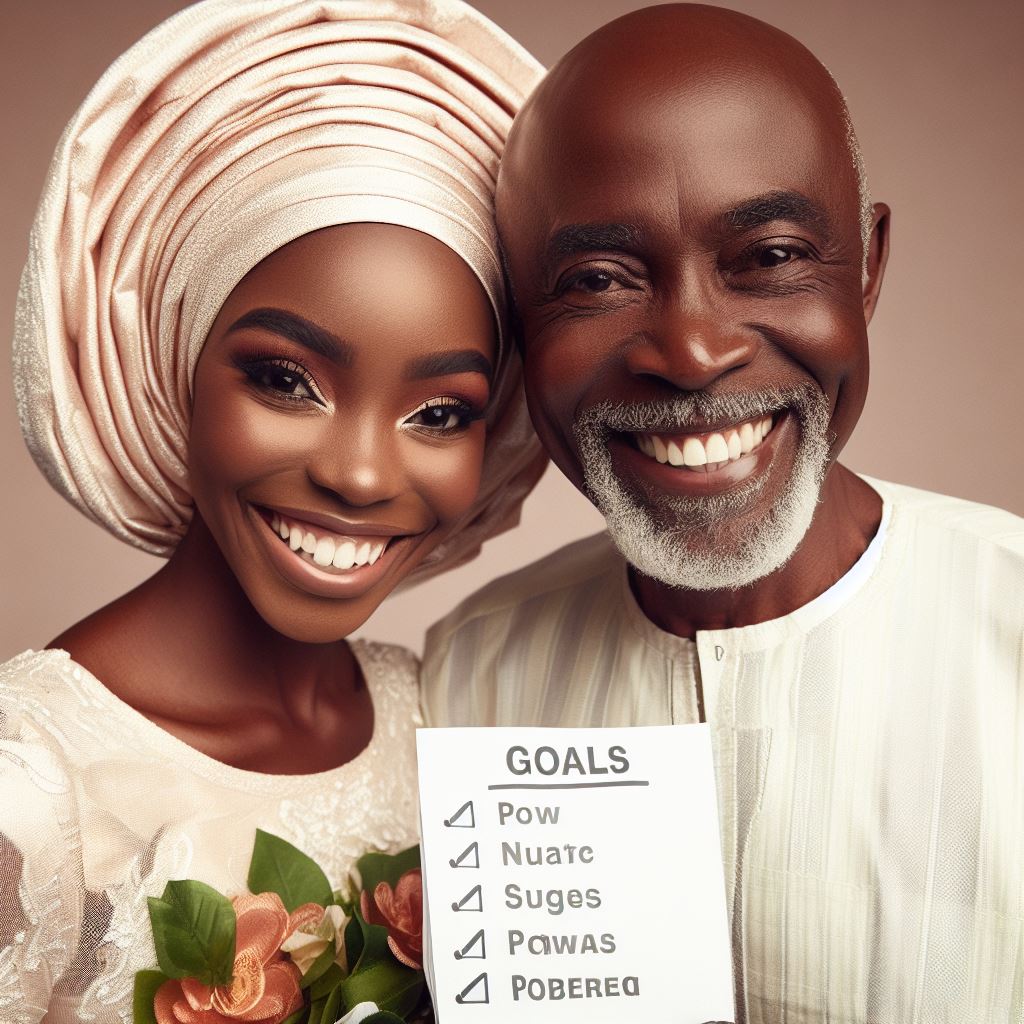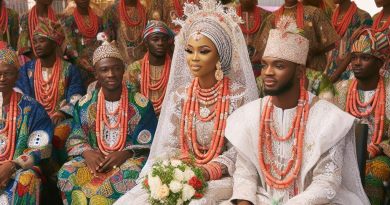Communication: The Pillar of Nigerian Marriage Success
Last Updated on January 28, 2024
Introduction
Nigerian marriages are characterized by diverse traditions and cultural practices, showcasing the nation’s rich heritage.
Effective communication plays a vital role in ensuring the success and longevity of these marriages.
In any marriage, communication acts as a bonding agent, allowing couples to express their feelings, needs, and desires.
It enables deeper understanding, empathy, and connection between partners.
Good communication also establishes a safe and supportive environment within the marriage, fostering trust and security.
It provides a platform for resolving conflicts and addressing issues promptly, preventing them from escalating and causing irreparable damage.
Couples who communicate effectively are more likely to experience marital satisfaction and happiness.
They create a strong foundation of love, respect, and mutual understanding, which can withstand the challenges and trials that may arise.
Furthermore, effective communication promotes emotional intimacy, helping partners to feel heard, valued, and validated.
It allows them to openly express their joys and sorrows, fears and hopes, which enhances emotional closeness and strengthens the marital bond.
In Nigerian marriages, where cultural expectations and gender roles may influence communication patterns, it is essential to embrace open and honest dialogue.
Breaking the barriers of tradition and societal norms can lead to a healthier and more fulfilling marital relationship.
In essence, effective communication serves as the pillar of Nigerian marriage success. It builds trust, strengthens emotional intimacy, resolves conflicts, and fosters unity.
By prioritizing communication, couples can cultivate a harmonious and resilient partnership that stands the test of time.
The role of communication in Nigerian marriages
Communication plays a vital role in the success of Nigerian marriages. It serves as the pillar that holds the relationship together, allowing couples to understand, support, and grow with each other.
Without effective communication, marriages can easily crumble under the weight of misunderstandings and unresolved issues.
Communication as the foundation of a successful relationship
One of the foundational elements of a successful relationship is the ability to communicate openly and honestly.
In Nigerian marriages, communication acts as a bridge that connects partners, enabling them to express their thoughts, feelings, desires, and concerns.
Through effective communication, couples can deepen their emotional connection, establish trust, and foster intimacy.
Traditional beliefs and practices that influence communication in Nigerian marriages
Traditional beliefs and practices greatly influence communication in Nigerian marriages. In many Nigerian cultures, respect for elders and authority figures is deeply ingrained.
This hierarchical structure often extends to marital relationships, where the husband is expected to be the head of the household, making major decisions on behalf of the family.
As a result, communication patterns may be more authoritarian, with the husband having the final say on important matters.
Traditional gender roles: Communication Nigerian Marriage
Furthermore, traditional gender roles play a significant role in shaping communication dynamics within Nigerian marriages.
Women are often expected to be submissive and prioritize the needs of their husbands and children above their own.
This can lead to a power imbalance and restrict the free expression of thoughts and emotions, especially for women.
However, Nigerian society is evolving, and many couples are challenging these traditional communication norms.
Modern Nigerian marriages emphasize the importance of equality and open dialogue between partners.
Both spouses are encouraged to actively participate in decision-making processes and share their perspectives without fear of judgment or retribution.
Effective communication in Nigerian marriages involves active listening, empathy, and mutual respect. It is about creating a safe space where both partners feel heard, valued, and understood.
Honest and open conversations help to address conflicts, find common ground, and make joint decisions that benefit the relationship as a whole.
To enhance communication in Nigerian marriages, couples can adopt various strategies. Regularly setting aside dedicated time to talk and listen to each other can strengthen the emotional connection.
Engaging in activities together, such as going on dates or taking walks, provides an opportunity for relaxed and informal communication.
Additionally, embracing technology can facilitate communication, especially in situations where couples have to be geographically apart.
Phone calls, video chats, and text messages can help maintain the connection and bridge the distance.
However, it is also essential to strike a balance between virtual and face-to-face communication to ensure a deep and meaningful connection.
Essentially, effective communication is the cornerstone of a successful Nigerian marriage.
Through open dialogue, active listening, and mutual respect, couples can build trust, intimacy, and understanding.
While traditional beliefs and practices may influence communication dynamics, modern Nigerian marriages are increasingly embracing equality and encouraging both partners to have a voice.
By prioritizing communication, Nigerian couples can navigate challenges, resolve conflicts, and create a foundation for a lasting and fulfilling relationship.
Read: Key Differences: Islamic Marriage vs. Marriage by Ordinance
Factors Affecting Communication in Nigerian Marriages
Communication plays a vital role in any marriage, including Nigerian marriages. It serves as the pillar of success, fostering understanding, trust, and harmony between partners.
However, several factors can hinder effective communication within Nigerian marriages.
These factors range from cultural and societal influences to gender roles and expectations, lack of education or communication skills, and communication barriers within extended family and in-laws.
In order to overcome these barriers, couples must be aware of them and work together to address them.
Cultural and Societal Influences
Nigerian marriages are heavily influenced by cultural and societal norms, which can affect communication dynamics.
Traditional practices and beliefs regarding marriage often prioritize respect and obedience over open and honest communication.
Couples may feel constrained by these expectations and find it challenging to openly express their thoughts, feelings, and concerns.
Gender Roles and Expectations
Gender roles and expectations can significantly impact communication within Nigerian marriages.
In many Nigerian households, men are seen as the head of the household and decision-makers, while women are expected to be submissive and obedient.
These roles can create power imbalances and hinder open communication, especially when it comes to discussing sensitive topics or making joint decisions.
Lack of Education or Communication Skills
Many Nigerians may lack formal education or sufficient communication skills, which can hinder effective communication.
Limited education can lead to difficulties in expressing oneself clearly, listening actively, and resolving conflicts in a healthy manner.
Couples who lack these skills may struggle to communicate effectively and may resort to unhealthy communication patterns such as yelling or avoidance.
Communication Barriers within Extended Family and In-laws
In Nigerian marriages, the influence of extended family and in-laws can pose communication challenges.
In many cases, extended family members play a significant role in decision-making, and their opinions may carry more weight than the couple’s own desires.
This can create tension and make it difficult for couples to freely express themselves and make decisions that align with their own values and goals.
Overcoming Communication Barriers in Nigerian Marriages
Promote Open and Honest Communication
Couples should create a safe and non-judgmental environment where they can openly express their thoughts, feelings, and concerns.
This requires active listening, empathy, and understanding from both partners.
Challenge Gender Roles and Expectations
Couples need to redefine traditional gender roles within their marriage and establish a partnership based on equality and mutual respect.
Both partners should have equal opportunities to express themselves and contribute to decision-making processes.
Invest in Communication Skills
Couples can benefit from workshops, counseling, or self-help resources that focus on improving communication skills.
Learning effective communication techniques such as active listening, assertiveness, and conflict resolution can help overcome barriers and promote healthier communication patterns.
Set Boundaries with Extended Family and In-laws:
Couples should establish clear boundaries with extended family members and in-laws while still respecting cultural norms and traditions.
It is essential to assert independence as a couple and make decisions based on what works best for the marriage.
In fact, effective communication is crucial for the success of any Nigerian marriage.
By understanding and addressing the factors that affect communication, couples can overcome these barriers and foster a healthy and fulfilling relationship.
Cultural and societal influences, gender roles and expectations, lack of education or communication skills, and communication barriers within extended family and in-laws can all be navigated through:
open communication, challenging traditional norms, improving communication skills, and setting boundaries.
Read: Cultural Importance of Marriage Papers in Nigerian Society

Benefits of effective communication in Nigerian marriages
Effective communication is a crucial aspect of any successful Nigerian marriage, offering numerous benefits. Here are some key advantages:
Building trust and understanding between partners
Through effective communication, couples can establish trust, promote transparency, and strengthen their emotional bond.
They can express their feelings, needs, and desires openly, fostering understanding and empathy.
Resolving conflicts and preventing misunderstandings
Effective communication enables couples to address conflicts promptly and constructively.
By actively listening, expressing themselves clearly, and seeking compromises, they can prevent misunderstandings from escalating into major issues, promoting harmony within the marriage.
Strengthening emotional connection and intimacy
Communication is essential for nurturing emotional intimacy in a Nigerian marriage.
Expressing affection, deepening emotional bonds, and sharing vulnerabilities can enhance the level of closeness and intimacy between partners.
Promoting shared decision-making and equal partnership
Effective communication ensures that both partners have a voice in decision-making processes.
It allows them to share their opinions, discuss ideas, and find mutually agreeable solutions, fostering a sense of equality within the relationship.
Facilitating effective problem-solving and collaboration
Through open and honest communication, couples can effectively tackle challenges together.
They can brainstorm solutions, seek advice, and support each other, creating a resilient partnership that can overcome obstacles.
Enhancing overall marital satisfaction and happiness
Effective communication is a significant contributor to marital satisfaction.
When couples feel heard, understood, and valued by their partners, it positively impacts their overall happiness and contentment within the marriage.
Strengthening family dynamics
Effective communication skills acquired within the marriage also extend to the wider family unit.
Couples who communicate effectively serve as role models for their children, promoting healthy communication habits within the family.
Promoting personal growth and self-awareness
Communication allows individuals to express their needs and boundaries, leading to personal growth and self-discovery.
It encourages self-reflection and facilitates constructive feedback, enabling partners to understand themselves and each other better.
Creating a supportive environment for emotional well-being
Effective communication ensures that partners feel comfortable discussing their emotions and seeking support when needed.
It fosters an environment where emotional well-being is prioritized and nurtured.
Strengthening commitment and longevity
Effective communication plays a vital role in sustaining long-term commitment and marital longevity.
It allows couples to navigate through the ups and downs of married life, evolving together and maintaining a strong sense of partnership.
Basically, effective communication serves as the pillar of success in Nigerian marriages.
Building trust, resolving conflicts, and strengthening emotional connections are just some of the many benefits that effective communication brings.
By investing in healthy communication habits, couples can foster lasting happiness and fulfillment within their marital relationship.
Tips for improving communication in Nigerian marriages
- Active listening and empathetic response: Give your partner your undivided attention, show understanding and respond with empathy.
- Expressing feelings and needs openly and respectfully: Share your emotions and desires honestly, while being respectful of your partner’s feelings.
- Creating a safe and supportive environment for communication: Establish an atmosphere of trust where both partners feel comfortable expressing themselves without fear of judgment.
- Seeking professional help or counseling if needed: If communication challenges persist, consider seeking guidance from a therapist or marriage counselor.
Read: What Expatriates Need to Know About Marrying in Nigeria
Learn More: Solomon’s Song: Exploring Love and Passion in Scripture
Tips for improving communication in Nigerian marriages
Communication is a vital aspect of any successful marriage, including Nigerian marriages.
Effective communication allows couples to understand each other better, resolve conflicts, and nurture a strong bond.
Here are some valuable tips for enhancing communication in Nigerian marriages:
Active listening and empathetic response
One of the foundations of good communication is active listening. When your partner speaks, give them your full attention.
Avoid interrupting or planning your response while they are talking. Instead, focus on understanding their perspective.
Show empathy by acknowledging their feelings and responding compassionately.
Expressing feelings and needs openly and respectfully
It is crucial for couples to express their emotions and needs openly. Share your thoughts, concerns, and joys with your partner.
Be honest and authentic in your communication, while also being respectful of your partner’s feelings.
Use “I” statements to express how you feel, rather than blaming or criticizing your partner.
Creating a safe and supportive environment for communication
Communication flourishes in a safe and supportive environment. Make an effort to create a space where both partners feel comfortable expressing themselves without fear of judgment or rejection.
Encourage open dialogue and validate each other’s opinions and experiences. Avoid using hostile or derogatory language, and prioritize kindness and understanding.
Seeking professional help or counseling if needed
Sometimes, couples may encounter communication challenges that they struggle to overcome on their own.
In such cases, seeking professional help or counseling can be invaluable.
A trained therapist or marriage counselor can provide guidance, teach effective communication techniques, and help couples work through deeper issues affecting their communication.
Remember, communication is an ongoing process that requires effort and commitment from both partners.
By implementing these tips, Nigerian couples can cultivate strong and healthy communication within their marriages, leading to increased understanding, trust, and overall success.
Read: Intercultural Marriages: Certificate and Customs in Nigeria
Conclusion
Effective communication is paramount for the success and fulfillment of Nigerian marriages. It is the pillar that holds the foundation of a strong and lasting relationship.
Throughout this blog sections, we have discussed the various ways in which communication plays a vital role in maintaining a healthy marriage.
We have examined how communication fosters trust, understanding, and emotional connection between spouses.
We have also highlighted how miscommunication can lead to misunderstandings, conflicts, and even the breakdown of relationships.
It is imperative for couples to prioritize effective communication in their marriages.
They should make it a habit to listen actively, express themselves honestly, and address any issues that arise promptly.
By doing so, couples can create an environment of open and honest communication, where both partners feel heard and valued.
This will not only strengthen their relationship but also promote intimacy, teamwork, and mutual support.
In a country like Nigeria, where cultural, societal, and economic factors can impact marriages, communication becomes even more crucial.
It can bridge the gap between different backgrounds, beliefs, and expectations, fostering a deeper connection between spouses.
I encourage all Nigerian couples to prioritize effective communication as a fundamental aspect of their marriage.
Invest time and effort into improving your communication skills, seek professional guidance if needed, and always remember that strong marriages are built on the foundation of open and honest communication.
By doing so, you can create a successful and fulfilling marriage, where love, understanding, and growth thrive.


